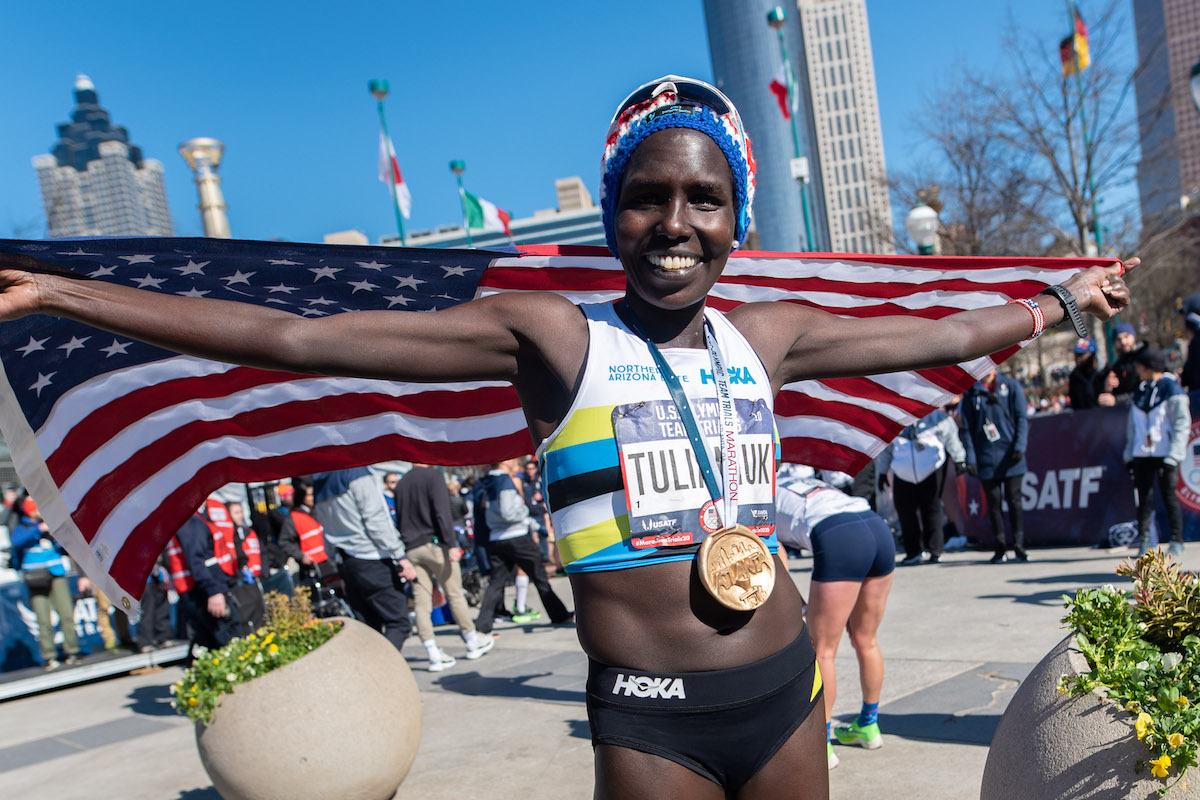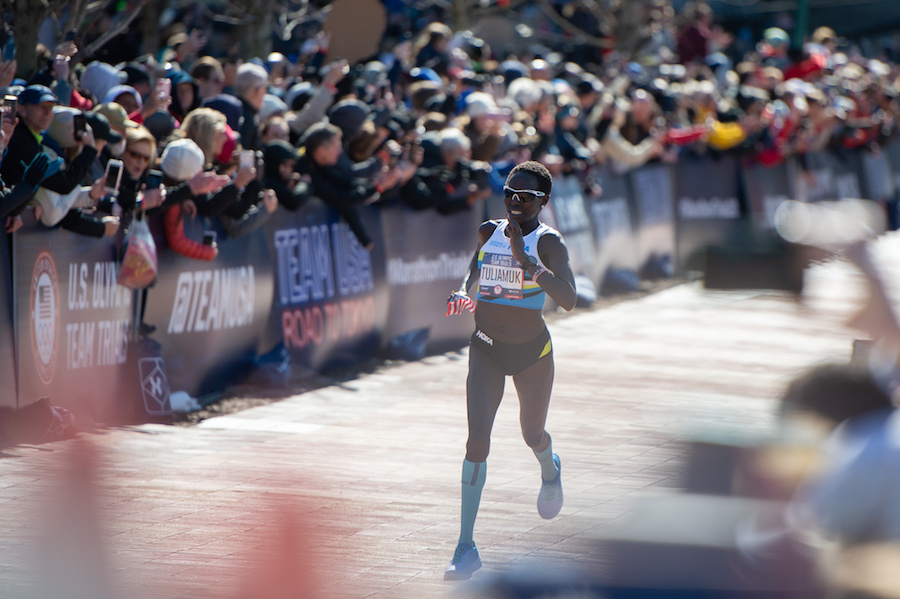
Leading up to the Olympic Marathon Trials, when Aliphine Tuliamuk closed her eyes at night, her mind settled: there were no visions of finish line glory, no nightmares of catastrophe on the hills of Atlanta.
“I never dreamt about the Olympic Trials, which was very strange,” recalls Tuliamuk.
As for lifelong dreams, they’ve always been there. Dreams that followed her from her village in Kenya through her stellar NCAA collegiate career to the day she was granted United States citizenship in 2016. Dreams of representing her new country in the Olympic Games.
That dream arrived in full technicolor when Tuliamuk, 31, crossed the finish line on February 29 as first overall female in the U.S. Olympic Marathon Trials. Posing for a photo-op after the race, she stood with her five other Olympic-bound teammates on a cold and windy afternoon in Atlanta, draped in the red, white, and blue of the American flag. Finally, without uncertainty, she would represent her adopted country at the 2020 Tokyo Games in July.
The Olympics– the crown jewel of the global sporting world– was a certainty, and virtually nobody questioned it at the time.
“After the race, we had a press conference, and someone asked what we thought about the coronavirus [affecting the Olympic Games] and at the moment I thought: ‘Are you crazy?’” remembers Tuliamuk. After all, 750 runners threaded the same hilly streets that day, with thousands of spectators lining the course.
Today, because of the global spread of the Covid-19, even a minor gathering, such as a high school track practice in Fulton County, Ga., could warrant an arrest.
It would be an understatement to say things have accelerated over the last six weeks at a pace reserved for 100-meter sprinters. Lives have been uprooted and reset. Hours meld into each other, morning into evenings into days without names. We’ve become no strangers to the strange, in both our waking and sleeping moments.
Olympians aren’t spared. These days, Tuliamuk dreams.
“Last night I had this weird dream that I was at the Olympics, and I was telling my manager I don’t know if I should run the marathon, or run the 10K, because if I run a marathon I can’t go back and help people,” says Tuliamuk, who has a degree in public health from Wichita State University. “But if I run the 10K, I can go back and help the next day.”
Tuliamuk feels the weight of this new world just like the rest of us. Unlike the rest of us, she had a specific race on her schedule in Tokyo this summer, until recently.
On March 24, the International Olympic Committee (IOC) announced that the 2020 Olympics would be postponed until next year; the date has now been confirmed for July 23-August 2, 2021.
While it wasn’t totally unanticipated, for members of the U.S. Olympic marathon team it was nevertheless a disheartening pause on a lifelong goal. For a brief moment, it was there in all its glory, a race ready to be run, now left to languish another year.
“I was very heartbroken just because never in my mind did I think the Olympics were going to be postponed,” says Tuliamuk.
Despite the initial shock, most athletes and fans recognize that it was the proper course of action. Even before the postponement, Canada announced it would not be sending its athletes to the Games if the July timeline remained unchanged. Other athletes were beginning to align with Canada’s sentiments towards the Games as well.
“I was like, ‘There’s no way they’re going to put this on, and if they do put it on, do we boycott?’” recalls Jake Riley, 31, the second-place men’s finisher at the U.S. Olympic Marathon Trials. “It is one-hundred-percent the right decision. I don’t see any way that any government could afford to send a team or take on all the safety concerns that need to be there.”
Tuliamuk agrees, even if the announcement was discouraging at the moment.
“I’ve come to terms with it now and I know it’s the right thing to do. There are people who are actually struggling with this,” says Tuliamuk, taking in the scope of the pandemic. “It’s amazing how fast our world can change, and then you realize that the world really is global. Once it happens in one part of the world, it can cripple the rest of it.”

Tuliamuk securing first place at the 2020 Olympic Trials
With the postponement, members of the U.S. Olympic marathon team are in an unprecedented position– assuming nothing changes (after all, it’s virtually unfeasible to hold another Trials), the athletes have a full extra year to focus on an Olympic goal. Instead of five months of training build-up, marathoners can potentially execute two or three marathon training blocks to fine-tune their performances.
For Riley, the training isn’t that much different than his original plans post-Olympics, but it does offer some room for flexibility. While he still may throw in a short cross-country segment, as well as a fall and spring marathon like Chicago or Boston, he’s also able to focus more on speed. Instead of mixing it into marathon blocks, he has the option of throwing in a dedicated speed work segment.
That said, Riley is crossing his fingers that outdoor exercise remains a viable activity during the course of the pandemic: “I don’t personally have a treadmill on my property, so it’s nice to know I don’t have to freak out about getting in training.”
Tuliamuk, a HOKA ONE ONE-sponsored athlete, looks at the extra time as a positive as well– a an extended period to gain more experience, as she has only run five marathons to date. “Having a year of training, I’m hoping it will put me in a better place with experience, compared to what it would be.”
In their personal lives, the extra time gives athletes some breathing room to focus on educational opportunities, business interests, and hobbies.
Riley is in the second year of a master’s degree in mechanical engineering and is someone who is accustomed to surviving on an unsponsored runner’s budget. The unexpected paycheck from his Olympic Trials showing allows him to dial back his part-time work as an SAT tutor so he can focus on his degree and training. If he lands with a sponsor, he can commit to running full time.
In Tuliamuk’s case, after the Olympic Trials marathon, running fans may have seen her sporting an Allie Resiliency Beanie, one of her own hand-made hats in a red, white, and blue colorway. While her Etsy store had solid interest leading up to the Trials, following the race she had to temporarily shut it down after an avalanche of orders overwhelmed the site.
She currently has some extra help on the side and is hoping to reopen the store in the next week. Her goal is to knock out close to a thousand hats before the Tokyo Games. After all, the word ‘resiliency’ resonates now more than ever.
“Right now, people need resilience. Regardless of how hard they’ve been knocked down, they can get up and move forward,” says Tuliamuk.
That type of resiliency is a hallmark of world-class athletes, and a trait the U.S. Olympic marathon team will draw from over the next year in preparation for the Tokyo Games. While the timetable and course of events are uncertain, the Olympics will happen again. When they do, it will bear a weight like no other Games before it.
“I think it has the potential to be a post-9/11 or post-Boston Marathon bombing type of event, a big coming together and a big catharsis after a lot of tragedy,” says Riley. “Being able to be a small part of unifying in the way that the Olympic Games are supposed to be is a pretty special idea.”
Tuliamuk agrees. “I am very blessed to be a person who is going to be shining that light at the end of the tunnel. Because after this pandemic, the world will need to heal and need something positive to focus on, and that will be the Olympics.
“History will be made with the world being put on hold, and I am so glad and excited to be a part of the history of the United States saying ‘here are the athletes we will put on the line after we had this horrible part of history in our world.’ I’m excited about being a part of that and looking forward to the time when we can all come together and celebrate the light at the end of the tunnel.”
Sometimes, a dream deferred makes the heart grow strong.
Have something to say? Leave a Comment